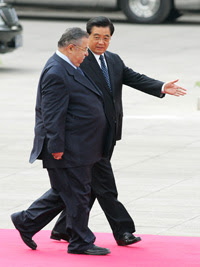 Alex Rossmiller, The American Prospect: Governments often send messages with their actions, particularly messages that can't really be delivered directly. A recent, mostly overlooked example of this was Iraq's announcement of a contract with China to buy $100 million worth of light weaponry.
Alex Rossmiller, The American Prospect: Governments often send messages with their actions, particularly messages that can't really be delivered directly. A recent, mostly overlooked example of this was Iraq's announcement of a contract with China to buy $100 million worth of light weaponry.Despite sounding significant, the amount is a relative pittance. Iraq also recently signed deals to buy $1.6 billion in U.S. arms, with another $1.8 billion in possible future purchases, so $100 million in arms is less than 3 percent of weapons deals planned by Baghdad in recent months. The symbolism, however, is tremendous, and for Baghdad to publicly announce the deal accentuates the point. Iraq may be under occupation, but this move is a reminder that there are other patrons available, benefactors who would be very happy to curry favor (and perhaps eventual oil contracts) by supplying military might. The central government in Baghdad, weak and under siege as it may be, still has plenty of oil money and, despite an apparently permanent occupation and no end of political manipulation by the United States, has the ability to act independently.
This small assertion of independence -- involving the only nation with an economy and military to rival the United States, no less -- reflects increasing Iraqi dissatisfaction with U.S. policy. The Shia-dominated Maliki government is profoundly concerned about the recent U.S. strategy of arming Sunnis, ostensibly against al-Qaeda, in Iraq's western, Sunni-controlled Anbar province. Shia leaders have warned against this program, complaining that arming and training "former" insurgents serves to arm a dissatisfied and rebellious anti-government force.
Iraq's stated reasons for the China deal include concerns about munitions supply to Iraqi police and army units. Iraq accuses the United States of delays in delivering weapons to national forces, which U.S. military officials have acknowledged, citing production and logistical problems in the foreign military sales program.
While Iraqi President Jalal Talabani claims that only one out of five Iraqi police officers is armed, it is hard to believe that the security problems are due to a lack of incoming arms. There are widespread reports and rumors of Iraqi army and police forces selling their munitions. Indeed, a recent Government Accountability Office report indicated that about 30 percent of all arms distributed to Iraqi forces since 2004 have gone missing, including over 110,000 AK-47s alone. With the number of weapons circulating in Iraq -- from the United States as well as black market sources -- it is unlikely that Iraq felt it "necessary" to deal with China to acquire arms.
What the Shia-led government does deem necessary, however, is finding a way to effectively deal with a unified and armed Sunni opposition. Perversely, as the United States is triumphant about Sunni efforts against jihadists, Maliki and his allies recognize that al-Qaeda is a far less potent threat to the central government than Iraqi Sunnis. This dissatisfaction remained below the surface for some time, but no longer. The United Iraqi Alliance, the coalition of Shia groups currently governing the country recently released a statement condemning the United States programs in Anbar as "authorizing the groups to conduct security acts away from the jurisdiction of the government and without its knowledge." It further blasted the Sunni targets of American embrace as "terrorist elements which committed the most hideous crimes against our people." The UIA demanded a halt to the outreach, and it is clear that the Shia are gravely concerned about the possibility that the United States may seek to expand the Anbar plan to Baghdad.
This conflict demonstrates the crippling problem with current U.S. efforts; namely, that we continue to focus on military issues almost to the exclusion of political and reconciliation efforts. Leaders of the Iraqi government claim that we are embracing and arming the group most likely to threaten its existence for the dubious purpose of countering a small jihadist element that is likely to be wiped out (and largely deprived of its casus belli) after U.S. withdrawal. It is a proposition difficult to dispute.
As the United States pursues a flawed and counterproductive strategy, Iraqi officials are more realistic. As Kurdish Deputy Prime Minister Barham Salih said recently, "I don't think there is something called reconciliation, and there will be no reconciliation as such. To me, it is a very inaccurate term. This is a struggle about power."
The Shia majority expects U.S. support in this struggle, and if it is lacking, they will increasingly express their dissatisfaction. The weapons deal with China indicates a new level of political hardball by Iraq's leadership. "We need you," Iraq's government is reminding us, "but we don't need you for everything. And if you insist on ignoring us, we can look elsewhere to make sure we win our civil war."
[Photo: Iraqi President Jalal Talabani (L) and Chinese President Hu Jintao (R) on June 21, 2007. It was the first visit by an Iraqi president to China since the two countries began diplomatic relations in 1958. (AP Photo/Greg Baker)]







No comments:
Post a Comment